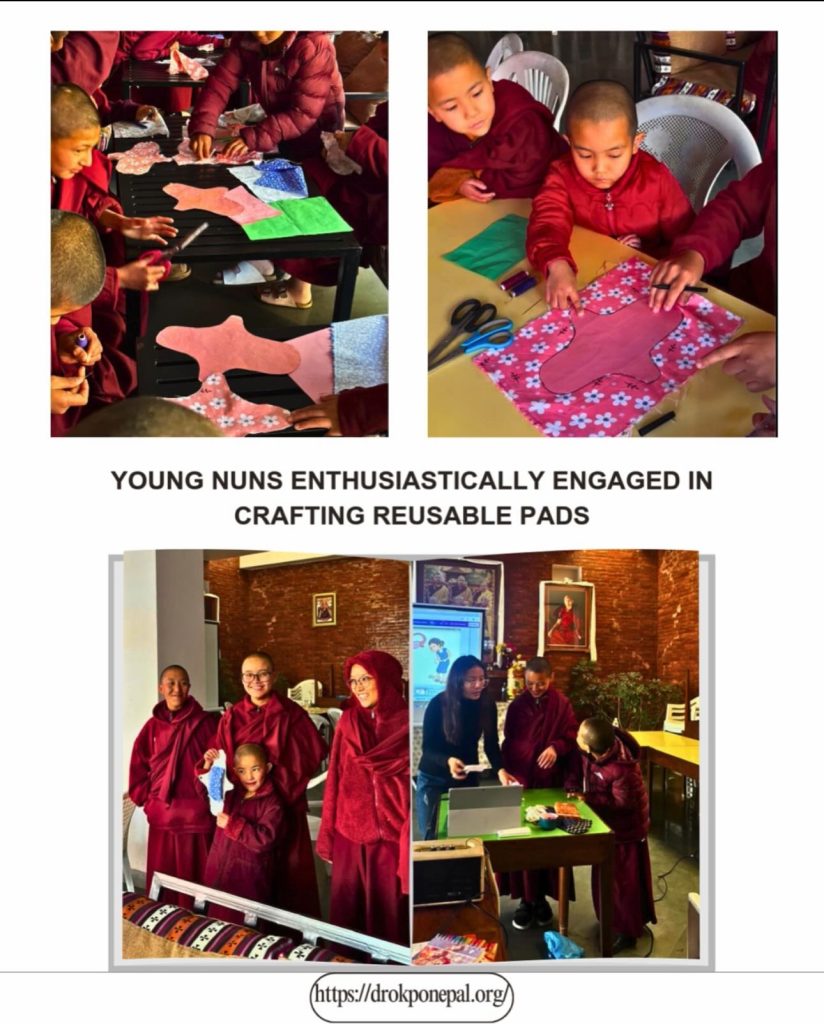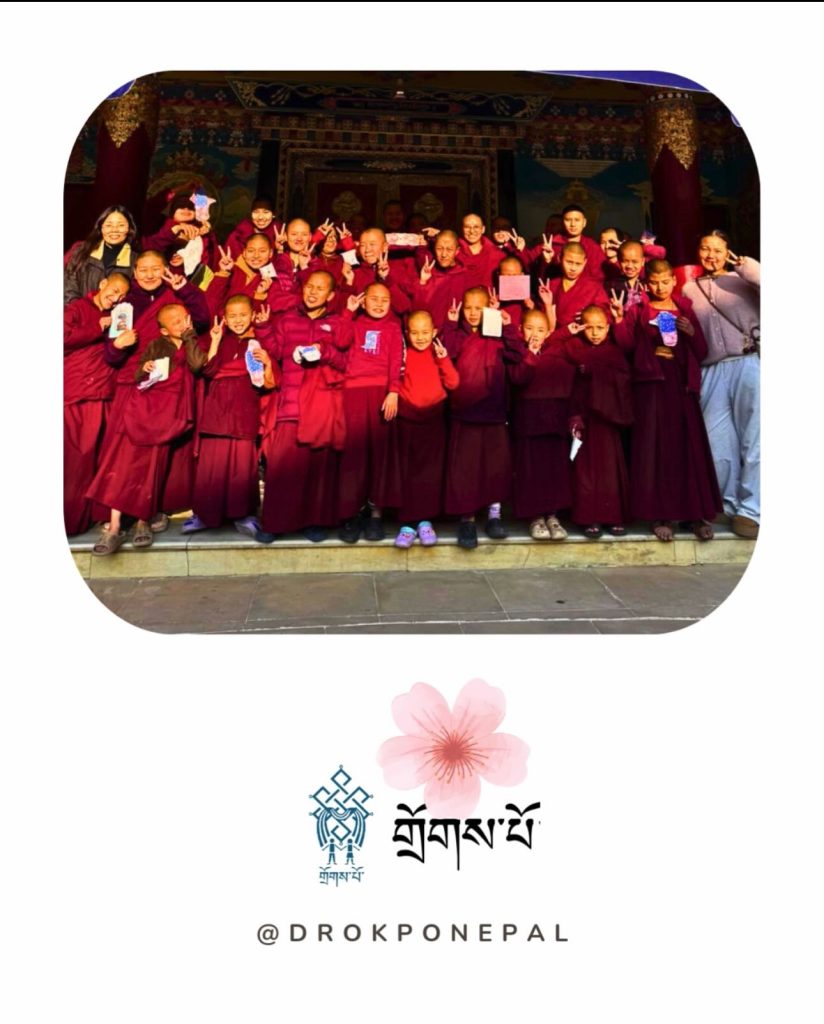Menstrual Hygiene Management & Hands-on Pad-Making Session at Osel Karma Tek Chok Ling Nunnery, Boudha
On January 24, 2025, Drokpo conducted an insightful Menstrual Hygiene Management session, including a hands-on pad-making workshop, at Osel Karma Tek Chok Ling Nunnery. Attended by 46 nuns, aged 6 to 48, the session aimed to provide essential education on menstrual health, hygiene, and sustainable menstrual practices.
The session began with an open discussion on menstruation and the common misconception that it is "dirty." Many of the nuns initially regarded menstruation as impure due to deep-rooted cultural beliefs. To foster a safe and supportive learning environment, we encouraged open dialogue, allowing participants to share their thoughts and ask questions freely.
We then introduced the topic of puberty, explaining the physical, emotional, and psychological changes that occur during this stage. The discussion covered hormonal shifts, mood changes, and bodily transformations experienced by young girls. We also addressed menstrual cramps caused by uterine contractions and introduced effective pain management techniques, such as yoga for relaxation, warm baths for soothing cramps, and the importance of hydration and a balanced diet to support overall well-being during menstruation.
Beyond biological and physical aspects, we tackled prevalent menstrual myths within the community, such as beliefs that menstruating individuals should avoid bathing, exercising, or visiting religious places. By challenging these misconceptions, we reinforced the understanding that menstruation is a natural and healthy bodily process.
A crucial part of the session focused on practical menstrual hygiene training, particularly the correct use and disposal of sanitary pads. This was especially important for the youngest nuns, aged six and seven, who were introduced to menstruation for the first time. We provided step-by-step demonstrations on unpacking, placing, wearing, and disposing of sanitary pads safely to ensure personal hygiene and environmental responsibility. To help the nuns feel comfortable and prepared, even those who had not yet started their periods were encouraged to practice wearing pads. While some were initially shy, they gained confidence and actively participated.
During the session, we discovered that many of the nuns mistakenly believed that menstrual blood and urine exit from the same opening. To clarify this, we provided a basic lesson on female anatomy using educational videos, explaining the distinct biological functions of the reproductive and urinary systems. Additionally, we emphasized proper hygiene practices to prevent infections such as urinary tract infections (UTIs).
The session concluded with an introduction to various menstrual products, including sanitary pads, menstrual cups, tampons, and reusable cloth pads. We discussed the advantages and disadvantages of each option, empowering the nuns to make informed choices based on their personal comfort and needs. Furthermore, we conducted a hands-on workshop on making reusable cloth pads, promoting eco-friendly and cost-effective menstrual care solutions.
Our primary goal was to empower young nuns with knowledge and confidence regarding menstruation by facilitating open conversations and providing practical skills. Through education and awareness, we hope to break stigmas and promote menstrual health as a natural and integral aspect of well-being.
On January 24, 2025, Drokpo conducted an insightful Menstrual Hygiene Management session, including a hands-on pad-making workshop, at Osel Karma Tek Chok Ling Nunnery. Attended by 46 nuns, aged 6 to 48, the session aimed to provide essential education on menstrual health, hygiene, and sustainable menstrual practices.
The session began with an open discussion on menstruation and the common misconception that it is "dirty." Many of the nuns initially regarded menstruation as impure due to deep-rooted cultural beliefs. To foster a safe and supportive learning environment, we encouraged open dialogue, allowing participants to share their thoughts and ask questions freely.
We then introduced the topic of puberty, explaining the physical, emotional, and psychological changes that occur during this stage. The discussion covered hormonal shifts, mood changes, and bodily transformations experienced by young girls. We also addressed menstrual cramps caused by uterine contractions and introduced effective pain management techniques, such as yoga for relaxation, warm baths for soothing cramps, and the importance of hydration and a balanced diet to support overall well-being during menstruation.
Beyond biological and physical aspects, we tackled prevalent menstrual myths within the community, such as beliefs that menstruating individuals should avoid bathing, exercising, or visiting religious places. By challenging these misconceptions, we reinforced the understanding that menstruation is a natural and healthy bodily process.
A crucial part of the session focused on practical menstrual hygiene training, particularly the correct use and disposal of sanitary pads. This was especially important for the youngest nuns, aged six and seven, who were introduced to menstruation for the first time. We provided step-by-step demonstrations on unpacking, placing, wearing, and disposing of sanitary pads safely to ensure personal hygiene and environmental responsibility. To help the nuns feel comfortable and prepared, even those who had not yet started their periods were encouraged to practice wearing pads. While some were initially shy, they gained confidence and actively participated.
During the session, we discovered that many of the nuns mistakenly believed that menstrual blood and urine exit from the same opening. To clarify this, we provided a basic lesson on female anatomy using educational videos, explaining the distinct biological functions of the reproductive and urinary systems. Additionally, we emphasized proper hygiene practices to prevent infections such as urinary tract infections (UTIs).
The session concluded with an introduction to various menstrual products, including sanitary pads, menstrual cups, tampons, and reusable cloth pads. We discussed the advantages and disadvantages of each option, empowering the nuns to make informed choices based on their personal comfort and needs. Furthermore, we conducted a hands-on workshop on making reusable cloth pads, promoting eco-friendly and cost-effective menstrual care solutions.
Our primary goal was to empower young nuns with knowledge and confidence regarding menstruation by facilitating open conversations and providing practical skills. Through education and awareness, we hope to break stigmas and promote menstrual health as a natural and integral aspect of well-being.


